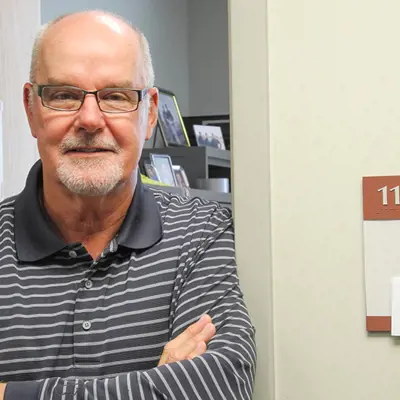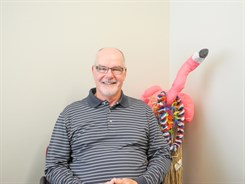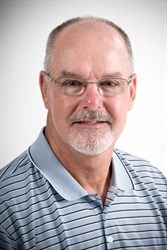
Getting to know Joe Loge
April 24, 2015
Joe Loge, advisor in University Division, is known as a storyteller by his colleagues. Before coming to USI, he was the principal at Castle Junior High School for 19 years and taught art classes at the school prior to that. He has worked at USI for the past 12 years, helping students undecided in their majors find their way, and discover their academic paths. On May 7, he will retire from USI, but before he does, let's find out what stories Loge has to share with us.
Tell me a little about what you do at USI.
I'm a University Division advisor. I advise students who are undecided about their major and help them with the first year transition and give them some insight into the different majors. The first two years I worked under a grant and it was called the Options Program. We worked with students taking courses at Ivy Tech and USI - helping with that transition. Some of the students were high risk students, so it took a lot of intervention. Then the program migrated into the University Division.
What will you miss the most about USI?
Without a doubt, the students. My favorite part of the day is talking with students.
What do you plan to do after retiring?
I'm looking forward to painting again. Two years ago I began learning guitar and I enjoy that, as well as playing lots of golf.
 I was told you have many interesting stories. Could you share one?
I was told you have many interesting stories. Could you share one?
I drove the world's largest single-bed dump truck. This truck was so big you could walk underneath it. The tires were so big it took four men to change one.
It was between my junior and senior year of college. I worked at the Peabody Coal Company coal mine in Lynnville, Indiana. I worked construction and drove a gob truck. Gob is the material you dig out as you get to the vein of coal - a clay and rock combination. They were building a road that ran parallel to the railroad tracks. Our job was to go down into the pit and scoop up gob with the big shovel and put it in our truck. Then we'd dump the gob and the bulldozer would level it out.
I noticed the bulldozer driver worked about a third of what we did because he'd be waiting for us to come with the gob. And we were driving back and forth and he's sitting there with his feet propped up until he sees us come. I thought 'that's the job I'd like to do.' So one night, third shift, he didn't show up for work, and our foreman asked if anyone could drive a bulldozer. I had never driven a bulldozer, but I said, "I can do it."
Let me just put it this way: I have a very high regard for heavy equipment operators. They make it look easy. I'm on this bulldozer and they're dumping the dirt and normally you'd take the blade and drag it to smooth it out. When my headlights would shine on what I'd just done, it looked like ocean waves. It looked horrible and I'm going back and forth and the trucks keep coming and dumping more dirt. Then a huge rock rolled up onto the railroad track and as I'm trying to pull it off with the bulldozer blade, a train comes.
The train has to stop because I can't get the rock off in time. This is at the end of a shift and not only did I stop a train, I shut down the coal mine, because the train is now blocking the only entrance in and out of the coal mine. First shift workers can't get in and third shift workers can't get out.
The engineer is cursing me and I thought, "I'm going to get fired." The superintendent of the mines comes down the road in his truck and the dust is rolling. He is livid. A guy gets out of the car, tells me to get off the bulldozer and within three minutes, he's leveled off my work, and dismisses me.
I don't know if I'm fired or what I'm supposed to do, so I showed up the next night and when I did, they put me on the world's largest single-bed dump truck. I'd like to tell you, you get punished for messing up, but in that case I moved up.
I also heard you were offered a minor league baseball contract?
I had a good senior year in baseball and was offered a professional contract. There were several scouts that were watching me, but the Cleveland Indians offered me a really good deal. They had just started offering $100,000 bonuses to sign and I was offered one. That was during the Vietnam War.
My dad and I stayed up until about 3:30 in the morning arguing over whether I was going to go to college or sign a baseball contract. He was worried if I did that, I'd get drafted. The only way you could get an exempt from being drafted was if you stayed in college. I wanted to play baseball but he was afraid I'd get drafted or would never go back to college. I gave in to my dad and it's a good thing I did. I had no plans to go to college and here I am today advising students about college.
I ended up going to LSU because the head scout of Cleveland, when I called him, told me he had a really good friend who was a baseball coach there. I lived in Boonville and had hardly been out of the county, let alone Baton Rouge, Louisiana. That was a real eye-opener for me.
In 1963 there wasn't a single black person on campus. I remember going to the State Capitol in Baton Rouge and there were restrooms for whites and restrooms for blacks. I'll never forget the water fountains. The one for whites was a cooler, so the water was chilled. The one for blacks was a porcelain right out of the tap. I'll never forget that experience, and while it was not pleasant, it was a lesson that has been etched in me forever. When I see racial bias of any sort, I remember that experience.
Almost everyone else was from Louisiana, except four guys from the north, and we all left the next year, because we couldn't adapt to that culture and mindset.
 Where did you go from there?
Where did you go from there?
I went to the University of Evansville and played football and baseball. I still didn't know what I wanted to do when I came to Evansville. When I declared my major, it was a huge change in attitude. The classes all began to be relevant. I started out as a major in art and a minor in physical education. I knew I wanted to teach and to coach, and then the state legislature changed and the law was passed that you had to be a physical education major, so I switched my major and minor, but I never taught in my major. I always taught art. It was a great combination because you don't find many people who coach high school football that are art teachers.
When you advise an undecided student, does it remind you of yourself as a beginning college student?
Oh yeah. When they're stressing out, I say "Let me share with you," because I remember that experience. It's difficult to take ownership of some of the classes when you don't know what you want to do. If you realize where they're coming from, it deepens that relationship. They put a little more trust in what you're saying.
What teacher in school made the most impact on you and why?
There are two people who come to mind. During my eighth grade year, a man named Norman Herd - he was our football coach. He had such an influence over all the young boys who played football at that time. He always buttoned the top button of his shirt and he wore white wigwam socks. If you see pictures of me in the eighth grade or my buddies, we all had our top button buttoned on our shirt and all wore white wigwam socks. He had a great impact on me in terms of my athletics.
The person who helped me as I grew older was the department chair in art at the University of Evansville, Les Miley. When you're in art, you do a lot of studio work and I was also playing football and baseball. It's not like doing math or English. With baseball, we were traveling all the time, so completing art projects was really tough. He gave me a key to the Fine Arts Building so if I got home from a football or baseball game on a Saturday night at 9 o'clock, I could go over and turn on the lights, pull out my project and work until the wee hours of the morning. He helped me immensely and, without him, it would have been really difficult for me to graduate on time.
What was one of your most defining moments in life?
The birth of my two children. I have two daughters, Kristen and Allyson.
Tell me something about you that most people don't know.
I got to meet Willie Nelson and on that same night I fell down a sewer hole, but I won't go into the details of that story.